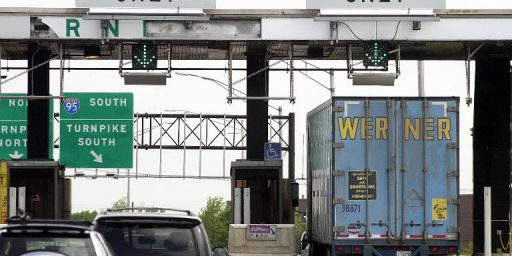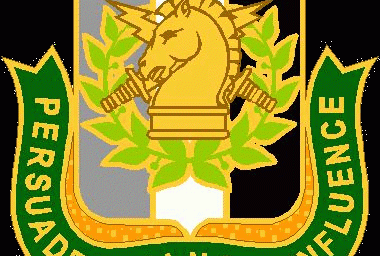A Pass on Privacy?
Christopher Caldwell has an interesting if somewhat chilling piece in the New York Times magazine on the steady erosion of personal privacy in exchange for convenience.
Anyone making long drives this summer will notice a new dimension to contemporary inequality: a widening gap between the users of automatic toll-paying devices and those who pay cash. The E-ZPass system, as it is called on the East Coast, seemed like idle gadgetry when it was introduced a decade ago. Drivers who acquired the passes had to nose their way across traffic to reach specially equipped tollbooths — and slow to a crawl while the machinery worked its magic. But now the sensors are sophisticated enough for you to whiz past them. As more lanes are dedicated to E-ZPass, lines lengthen for the saps paying cash.
E-ZPass is one of many innovations that give you the option of trading a bit of privacy for a load of convenience. You can get deep discounts by ordering your books from Amazon.com or joining a supermarket ”club.” In return, you surrender information about your purchasing habits. Some people see a bait-and-switch here. Over time, the data you are required to hand over become more and more personal, and such handovers cease to be optional. Neato data gathering is making society less free and less human. The people who issue such warnings — whether you call them paranoids or libertarians — are among those you see stuck in the rippling heat, 73 cars away from the ”Cash Only” sign at the Tappan Zee Bridge.
[…]
In more and more walks of life, if what you want to do is not trackable, you can’t do it. Most consumers have had the experience of trying to buy something negligible — a pack of gum, say — and being told by a cashier that it’s impossible because ”the computer is down.” It now seems quaint that after the Oklahoma City bombing in 1995, Congress argued over whether ”taggants” should be required in explosives to make them traceable. Today everything is traceable. Altered plant DNA is embedded in textiles to identify them as American. Man-made particles with spectroscopic ”signatures” can be used, for example, as ”security tags” for jewels. The information collected about consumers is the most sophisticated and confusing taggant of all. It is a marvelous tool, a real timesaver and a kind of electronic bracelet that turns the entire world into a place where we are living under house arrest.
Interesting, indeed. I’ve got an E-ZPass sister, Smart Tag, on my vehicle for use on the Dulles Toll Road and, frankly, get rather irritated that more lanes aren’t Smart Tag-only. There’s no question that I’m willing, in this case, to trade a little theoretical privacy for a substantial amount of apparent time saving.
As Caldwell points out, though, the device could easily be adapted to automatically write traffic tickets for those who pass from one toll gate to the next faster than the legal speed limit. Of course–presuming they’re still voluntary–most of us would promptly disconnect our trackers.
I make all manner of similar choices. For example, I use credit cards rather than cash virtually everywhere that doing so is an option. Theoretically, this creates the ability for Big Brother to track my spending habits and movements. I take comfort in the ubiquity of such information and the belief that it’s incredibly unlikely that government resources will be allocated to track the purchase habits of 290-odd million citizens.





Big Brother IS watching us–and the very people who were hoorified by Orwell’s vision a generation ago are now doing everything they can to make it happen.
Your use of the EZ Pass can be used to track your movement. Last year a Baltimore DA was murdered in Pennsylvania and the police examined his movements before his death and notice strange trips he took by examining his EZ pass records. Certainly if I were paranoid about not wanting someone to know my movements I wouldn’t be using the EZ Pass. I’ll be with the rest of the paranoids in the cash lane.
The people who get upset over this are the ones who want freedom for aggression, most likely. those who want freedom from aggression, will not be agitated about the possibility of the government collecting information; there have always been so many ways of doing that. It is the aggressors and their advocates who have to fear the witness.
EZPass is of course optional
it’s optional if you’re only an occasional user of the toll system. Try telling that to the drivers who drive daily into NYC in the Holland Tunnel. I tried to get use the cash lane on a saturday and it took me almost an hour to get to the booth, meanwhile the EZpass lanes were wide open. That made me decide to get the EZpass for future trips into NYC.
‘Try telling that to the drivers who drive daily into NYC in the Holland Tunnel.’
OK – it is optional
WE have FastPass here in the SF Bay Area, for the Bay Bridge from Oakland to San Francisco. A few weeks ago, some guy wrote a letter to the paper saying he was cancelling his pass because “the government” could keep track of when he went into San Francisco. Whoop de doo. Who gives a crap? Everything we do is tracked. Every ATM transaction. Every debit card hit. Every credit card. Every website. Every purchase that’s linked to a card we hold. If you’re that worried about it, pay the hooker in cash and use cash to buy porn at the local XXX store.